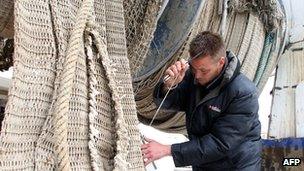Fisheries reforms: MEPs back plan to protect stocks
- Published

The EU aims to tighten the specifications for tackle to help prevent overfishing
Euro MPs have backed fisheries reforms aimed at protecting endangered stocks and curbing the practice of throwing unwanted fish back into the sea dead.
Fish discarded at sea are reckoned to account for almost a quarter of all EU catches.
The fisheries committee vote came as EU ministers began negotiations on next year's fishing quotas.
Scottish MEP Struan Stevenson, who is on the committee, said the changes would give the regions more control.
"This is a real breakthrough on the issue of regionalisation and will help wrest control away from the micro-managers in Brussels," he said.
Greenpeace environmental expert Saskia Richartz said the vote "marks a turning point after decades of complacency for overfishing".
The European Commission estimates that 80% of Mediterranean stocks and 47% of Atlantic stocks are overfished.
The reforms aim for more sustainable fisheries management, and to get away from the annual haggling over fish quotas.
Tougher monitoring
The changes to the Common Fisheries Policy (CFP) propose obliging trawlers to land all catches in accordance with a calendar for each species, starting in 2014. In addition, undersized fish in the catch would be banned from sale for human consumption.
Mr Stevenson said the reforms should also include funding to help trawlers install more ecological equipment, especially new nets, to minimise unwanted catches.
Fishing crews would still be able to discard some species that have a high survivability rate, like prawns and crabs, up to a 5% limit in the catch, he said.
The MEPs objected to the Commission's call for transferable concessions - the idea that fleets could trade their catch quotas within a nation over long periods. However, Mr Stevenson said member states "may introduce a system of temporary transfers, similar to what happens at present, if they wish, within their own zones".
Some environmentalists have warned that tradable concessions could lead to monopolisation of catches by big fleets.
Scotland's Fisheries Secretary Richard Lochhead welcomed the MEPs' plan, calling it "a key milestone on the long road of reforming the badly broken CFP".
He said he was glad MEPs had rejected proposals for transferable quotas - "proposals which would have seen Scotland's fishing rights be owned by those with the deepest pockets".
The MEPs' plan for the CFP builds on reforms proposed by the Commission last year. The amended plan is expected to be put to a vote in the full European Parliament in February, so that the new CFP can take effect in 2014.
Under the Lisbon Treaty MEPs now help to shape EU laws in the area of agriculture and fisheries.
- Published18 December 2012
- Published17 December 2012
- Published6 February 2013
- Published30 September 2012